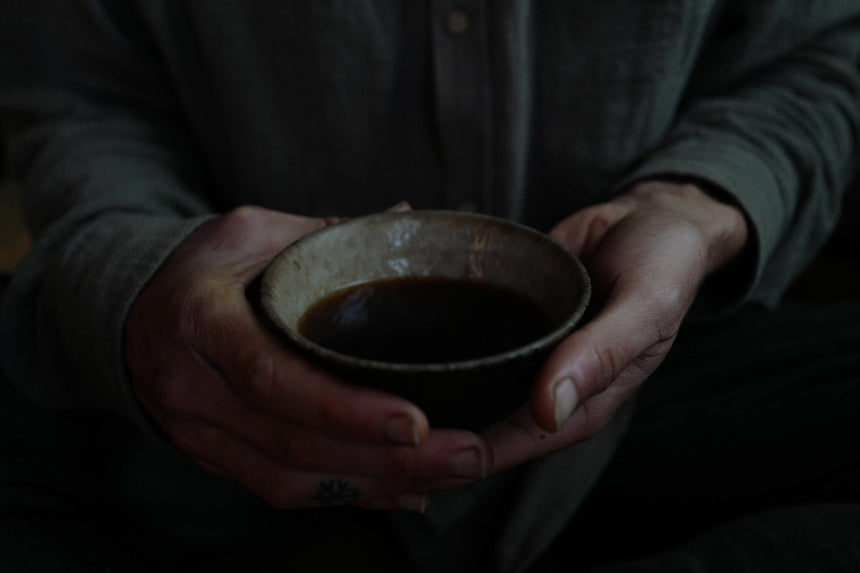Caffeine in tea?
Some of us ask this question before coming to tea ceremony.
Others who have enjoyed stillness and a sense of tranquility from having already sat in ceremony then ask, and the answer pierces through the feeling of calm and a questioning mind takes over.
The answer is yes, tea has caffeine, all tea in fact does.
However the unique synergistic relationship between caffeine and theanine is what can offer a more calming and relaxed experience.
This topic and our conditionings towards caffeine can be a very sensitive one as well as circumstantial to each and every person. It wouldn’t be fair to umbrella term caffeine as this or that, and expect it to be the same for every person because it simply can’t.
Tea is the second most consumed substance by humans behind water.
Globally over 3 billion people drink tea each day, many cultures don’t even question or deconstruct the element of caffeine, simply enjoying cup of teas for a lifetime and more. It is a prominent approach by western society to pick apart, analyse and seperate.
However below are a few areas within a very large discussion which perhaps can be a surprising read to start getting an idea as to how caffeine may effect us in different ways, it could even be an opportunity to change your relationship with it.

Tea and Coffee • Understanding the Differences in Caffeine
Caffeine is a natural stimulant found in many beverages, including tea and coffee. While both tea and coffee can provide a boost of energy and alertness, they differ in several ways when it comes to caffeine.

Caffeine is a molecule that belongs to a class of compounds called xanthines.
It acts on the central nervous system by blocking the adenosine receptors, which normally promote relaxation and drowsiness.
A main difference between tea and coffee for example, is the presence of other compounds that can affect the interaction between caffeine and the body. Coffee contains chlorogenic acid, which can slow down the absorption of caffeine and prolong its effects. Coffee also contains various acids and oils that can irritate the stomach and cause acid reflux or heartburn in some people. Tea, on the other hand, contains theanine, which can counterbalance the potential negative effects of caffeine by promoting a sense of calm and focus, which more often then not is how people associate feeling when sitting in ceremony or casually.
A main difference between tea and coffee for example, is the presence of other compounds that can affect the interaction between caffeine and the body. Coffee contains chlorogenic acid, which can slow down the absorption of caffeine and prolong its effects. Coffee also contains various acids and oils that can irritate the stomach and cause acid reflux or heartburn in some people. Tea, on the other hand, contains theanine, which can counterbalance the potential negative effects of caffeine by promoting a sense of calm and focus, which more often then not is how people associate feeling when sitting in ceremony or casually.
The magic combination of why tea is well received even by those sensitive to caffeine is when theanine comes in. Theanine is an amino acid found almost exclusively in tea, especially in green tea and black tea. It has been shown to have calming and relaxing effects on the brain, without causing drowsiness as well as increasing the production of alpha waves in the brain that are associated with a state of wakeful relaxation and mental clarity which is often how a meditative mind can feel. Calm yet alert.
Caffeine and theanine are two natural compounds in tea that can work together to provide a unique and enjoyable tea experience. By beginning to understand the science behind these two, you can choose, prepare and drink your tea accordingly.

Whilst the more scientific conversations could go on and on, this is simply an answer to the question of does tea have caffeine with a small offering as to how it can perhaps be experienced differently to the usual narrative.
It is important to absorb information that is beneficial, but to do our best in not getting caught up in this approach.
Our relationship to anything is always circumstantial on our emotional state, current responsibilities and every thing else on top that we navigate on a day to day basis in a fast moving society.
Coming back to a feeling based experience and knowing if maybe 2 bowls is enough today, tomorrow could be 6 and choosing quantity of leaf when brewing at home according to how we feel can offer us a more mindful approach that provides a sense of wellbeing to our daily lives and practice of tea.
